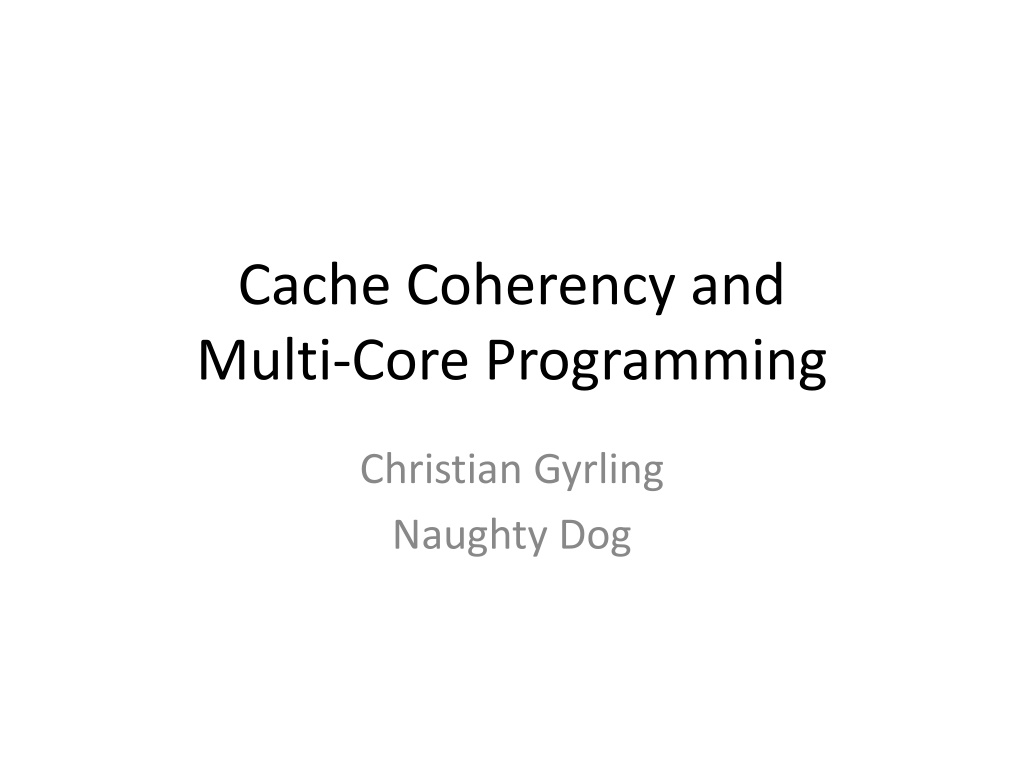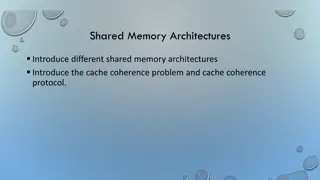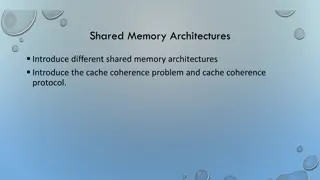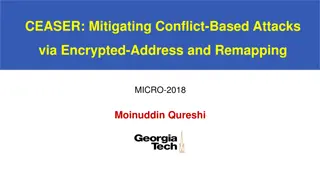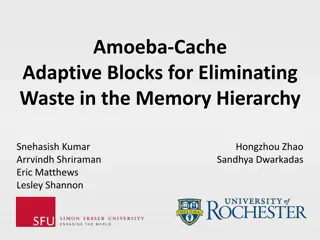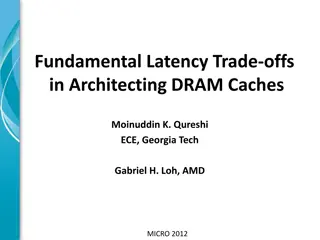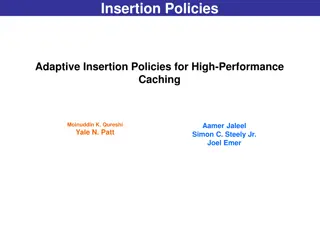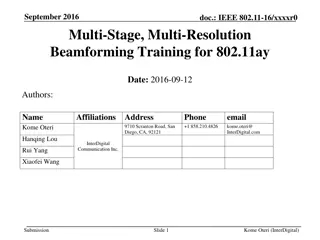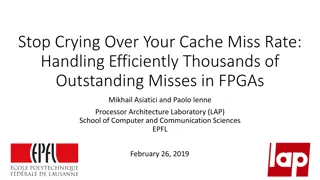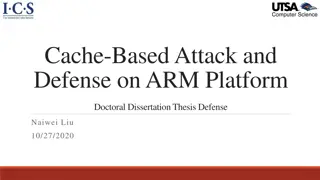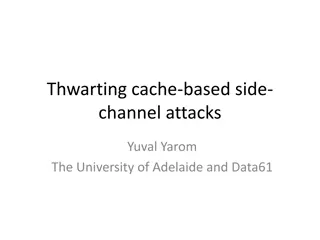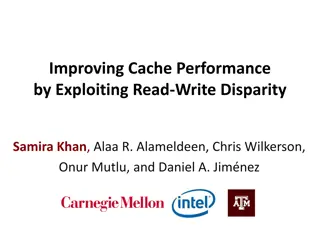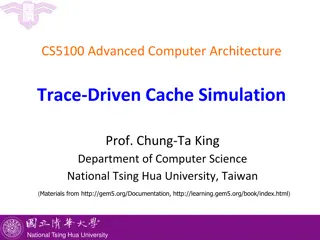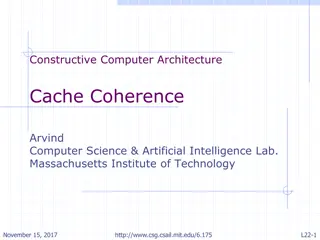Cache Coherency and Multi-Core Programming
Explore the intricate world of cache coherency and multi-core programming through images and descriptions covering topics such as how cache shares data between cores, maintaining data consistency, CPU architecture, memory caching, MESI protocol, and interconnect bus communication.
Download Presentation

Please find below an Image/Link to download the presentation.
The content on the website is provided AS IS for your information and personal use only. It may not be sold, licensed, or shared on other websites without obtaining consent from the author.If you encounter any issues during the download, it is possible that the publisher has removed the file from their server.
You are allowed to download the files provided on this website for personal or commercial use, subject to the condition that they are used lawfully. All files are the property of their respective owners.
The content on the website is provided AS IS for your information and personal use only. It may not be sold, licensed, or shared on other websites without obtaining consent from the author.
E N D
Presentation Transcript
Cache Coherency and Multi-Core Programming Christian Gyrling Naughty Dog
I Haz Code Skillz This is a very technical talk so this is the only fun slide. Enjoy it!
Questions How does the cache share data between cores? How does the data stay consistent when multiple cores are updating memory at the same time?
Simple 2-core CPU Core Core L1 Cache L1 Cache ICB Inter Connect Bus Memory Controller Main Memory
Caching Main Memory Address Variable Value Local Cache On Chip 0x40000 B 4 0x40100 C 2 0x40400 F 34 0x40200 D 6 0x40300 E 8 0x40400 F 34 0x40600 H 3 0x40500 G 787 0x40600 H 3 0x40700 I 879798 0x40800 J 32 0x40D00 O 55 0x40900 K 42 0x40A00 L -9 0x40B00 M 88 0x40C00 N 6 0x40D00 O 55 0x40E00 P 0 Data stored in cache lines (64 / 128 bytes) Fast access to recently used cache lines
ICB Inter Connect Bus Connects cores Not just data Cache coherence protocol Cache coherence domain Usually all processors and all cores
The MESI Protocol Cache Coherence Any given cache line can only be modified by one core at a time. A cache line can be in 4 states (M)odified Exclusively modified copy of main memory among all cores (E)xclusive Exclusive copy of main memory among all cores (S)hared An exact copy of what is in main memory AND other cores may also have an unmodified copy (I)nvalid The cache line is stale and is no longer valid
MESI Protocol Messages Messages are sent on the ICB to maintain coherency between the caches Anyone on the ICB can reply to the Read messages Not just the memory controller but also other cores.
MESI Message Types Message Types (refers to a cache line) Read / Read Acknowledge RWITW Read With Intent To Write Read + Invalidate Invalidate / Invalidate Acknowledge Ask other cores to invalidate this cache line Writeback Write back cache line to main memory
Cache line transitions Read cache line Invalid -> Exclusive only core with a copy Invalid -> Shared other cores also have a copy Write to cache line Exclusive -> Modified Shared -> Modified all other cores invalidate their version of this cache line Told to invalidate Exclusive / Shared -> Invalid Modified -> Invalid triggers a writeback to main memory Another core want to read our modified cache line Modified -> Shared triggers a writeback to main memory
The Players Example Core 0 - Producer void foo() { data = 1; flag = 1; } void bar() { while (flag == 0); assert(data); } Core 1 - Consumer
Cache Ownership Example Initially Core 0 s cache is empty and Core 1 s contain the a and b cache lines Core 1 Core 0 - - I a 1 E - - I b 0 E ICB if (a) { b = 4; } a 1 a and b are on separate cache lines b 0 Main Memory
Cache Ownership Example Core 0 does not have a in its cache and therefore requests it Core 1 Core 0 - - I a 1 E - - I b 0 E ICB Read (a) if (a) { b = 4; } a 1 a and b are on separate cache lines b 0 Main Memory
Cache Ownership Example Core 1 sees the request and has the cache line a . It responds with the cache line and marks its own version as Shared Core 1 Core 0 - - I a 1 S - - I b 0 E ICB Read Response (a=1) if (a) { b = 4; } a 1 a and b are on separate cache lines b 0 Main Memory
Cache Ownership Example Core 0 receives the cache line and installs it in its cache. The branch can now be evaluated Core 1 Core 0 a 1 S a 1 S - - I b 0 E ICB Read Response (a=1) if (a) { b = 4; } a 1 a and b are on separate cache lines b 0 Main Memory
Cache Ownership Example Core 0 does not have b in its cache and therefore requests it. This time the request has a hint to indicate the intent to write to b . Core 1 Core 0 a 1 S a 1 S - - I b 0 E ICB RWITW (b) if (a) { b = 4; } a 1 a and b are on separate cache lines b 0 Main Memory
Cache Ownership Example Core 1 sees the request on the ICB and returns the cache line. Because the RWITW implies an invalidate request Core 1 now also invalidates b Core 1 Core 0 a 1 S a 1 S - - I b 0 I ICB RWITW (b=0) if (a) { b = 4; } a 1 a and b are on separate cache lines b 0 Main Memory
Cache Ownership Example Core 0 receives the b cache line and installs it in its cache as Exclusive Core 1 Core 0 a 1 S a 1 S b 0 E b 0 I ICB RWITW (b=0) if (a) { b = 4; } a 1 a and b are on separate cache lines b 0 Main Memory
Cache Ownership Example Core 0 now has the cache line and can commit the store to b . This marks the cache line as Modified but stays in the cache and is not saved to main memory. Core 1 Core 0 a 1 S a 1 S b 4 M b 0 I ICB if (a) { b = 4; } a 1 a and b are on separate cache lines b 0 Main Memory
2-core CPU + Store Qs Core Core Store Q Store Q L1 Cache L1 Cache ICB Inter Connect Bus Memory Controller Main Memory
Reasons for Store Q Prevent CPU execution stall while waiting for a missing/invalid cache line Loads can now pass stores if the cache line is more readily available It might be available in the local cache already or by a neighboring core. Requires snooping the Store Q for loads to ensure that memory looks the same for the locally running core. Even if the store hasn t made it into the cache a subsequent load should load the value that was stored
Store Q Issue Example Core 1 Core 0 Cache/Store Q Cache/Store Q Core 0 executes foo Core 1 executes bar flag cache line is owned by 0 data cache line is owned by 1 - - I data 0 E flag 0 E - - I void foo() { data = 1; flag = 1; } ICB data 0 void bar() { while (flag == 0); assert(data); } flag 0 Main Memory
Store Q Issue Example Core 1 Core 0 Cache/Store Q Cache/Store Q data Core 0 saves the store in the Store Q and issues a RWITW message for data due to it not being in the cache 1 - - I data 0 E flag 0 E - - I void foo() { data= 1; flag = 1; } ICB RWITW (data) data 0 void bar() { while (flag == 0); assert(data); } flag 0 Main Memory
Store Q Issue Example Core 1 Core 0 Cache/Store Q Cache/Store Q data Core 1 issues a read message for flag due to it not being in the cache 1 - - I data 0 E flag 0 E - - I void foo() { data= 1; flag = 1; } ICB Read (flag) data 0 void bar() { while (flag == 0); assert(data); } flag 0 Main Memory
Store Q Issue Example Core 1 Core 0 Cache/Store Q Cache/Store Q data Core 0 owns flag and hence updates the cache with 1 and marks as modified 1 - - I data 0 E flag 1 M - - I void foo() { data= 1; flag = 1; } ICB data 0 void bar() { while (flag == 0); assert(data); } flag 0 Main Memory
Store Q Issue Example Core 1 Core 0 Cache/Store Q Cache/Store Q data Core 0 respond to the read request of flag The cache line is written back to main memory and also marked as Shared. 1 - - I data 0 E flag 1 S - - I void foo() { data= 1; flag = 1; } ICB Read Response (flag=1) data 0 void bar() { while (flag == 0); assert(data); } flag 1 Main Memory
Store Q Issue Example Core 1 Core 0 Cache/Store Q Cache/Store Q data Core 1 receives the read response and marks the cache line as Shared 1 - - I data 0 E flag 1 S flag 1 S void foo() { data= 1; flag = 1; } ICB Read Response (flag=1) data 0 void bar() { while (flag == 0); assert(data); } flag 1 Main Memory
Store Q Issue Example Core 1 Core 0 Cache/Store Q Cache/Store Q data Core 1 now moves on to the next instruction. data is in the cache and is therefore read. ASSERT!! 1 - - I data 0 E flag 1 S flag 1 S void foo() { data= 1; flag = 1; } ICB data 0 void bar() { while (flag == 0); assert(data); } flag 1 Main Memory
Store Q Issue Example Core 1 Core 0 Cache/Store Q Cache/Store Q data Core 1 now receive the delayed Read Invalidate message. It replies and marks its cache line as invalid 1 - - I data 0 I flag 1 S flag 1 S void foo() { data= 1; flag = 1; } ICB RWITW Resp. (data=0) data 0 void bar() { while (flag == 0); assert(data); } flag 1 Main Memory
Store Q Issue Example Core 1 Core 0 Cache/Store Q Cache/Store Q data Core 0 receives the cache line and installs it in its cache. 1 data 0 E data 0 I flag 1 S flag 1 S void foo() { data= 1; flag = 1; } ICB RWITW Resp. (data=0) data 0 void bar() { while (flag == 0); assert(data); } flag 1 Main Memory
Store Q Issue Example Core 1 Core 0 Cache/Store Q Cache/Store Q Core 0 s Store Q can finally commit the write to the flag cache line but it is too late. Core 1 is halted and execution stops. data 1 M data 0 I flag 1 S flag 1 S void foo() { data= 1; flag = 1; } ICB data 0 void bar() { while (flag == 0); assert(data); } flag 1 Main Memory
How do we solve this issue? All caches have a coherent view of main memory BUT local writes are not part of that We need a way to ensure that our stored data is part of the cache coherent domain I.e Visible by other cores I.e Can be fetched by other caches Can we flush the store Q to the cache? Memory Store Barriers (__mb_release)
Memory Store Barriers CPU instruction that won t return until all data in the Store Q preceding the memory barrier is in the cache CPUs are evil! Prevents compilers from optimize memory stores across this barrier. Compilers are evil! Once the data is in the cache it can be seen by all other caches due to the cache line being invalidated in all other caches. RWITW (Read With Intent To Write) Read + Invalidate
Store Q Issue Example (Fixed) Core 1 Core 0 Cache/Store Q Cache/Store Q Core 0 executes foo Core 1 executes bar data cache line is owned by 1 flag cache line is owned by 0 - - I data 0 E flag 0 E - - I void foo() { data = 1; __mb_release(); flag = 1; } ICB data 0 void bar() { while (flag == 0); assert(data); } flag 0 Main Memory
Store Q Issue Example (Fixed) Core 1 Core 0 Cache/Store Q Cache/Store Q data Core 0 saves the write in the Store Q and issues a RWITW message for data due to it not being in the cache 1 - - I data 0 E flag 0 E - - I void foo() { data = 1; __mb_release(); flag = 1; } ICB RWITW (data) data 0 void bar() { while (flag == 0); assert(data); } flag 0 Main Memory
Store Q Issue Example (Fixed) Core 1 Core 0 Cache/Store Q Cache/Store Q data Core 1 issues a read message for flag due to it not being in the cache 1 - - I data 0 E flag 0 E - - I void foo() { data = 1; __mb_release(); flag = 1; } ICB Read (flag) data 0 void bar() { while (flag == 0); assert(data); } flag 0 Main Memory
Store Q Issue Example (Fixed) Core 1 Core 0 Cache/Store Q Cache/Store Q data Core 0 blocks on the memory barrier for the store Q to be flushed to the cache 1 - - I data 0 E flag 0 E - - I void foo() { data = 1; __mb_release(); flag = 1; } ICB data 0 void bar() { while (flag == 0); assert(data); } flag 0 Main Memory
Store Q Issue Example (Fixed) Core 1 Core 0 Cache/Store Q Cache/Store Q data Core 0 respond to the read request of flag The cache line sent to Core 1 and also marked as Shared on Core 0. 1 - - I data 0 E flag 0 S - - I void foo() { data = 1; __mb_release(); flag = 1; } ICB Read Response (flag=0) data 0 void bar() { while (flag == 0); assert(data); } flag 0 Main Memory
Store Q Issue Example (Fixed) Core 1 Core 0 Cache/Store Q Cache/Store Q data Core 1 receives the read response and marks the cache line as Shared 1 - - I data 0 E flag 0 S flag 0 S void foo() { data = 1; __mb_release(); flag = 1; } ICB Read Response (flag=0) data 0 void bar() { while (flag == 0); assert(data); } flag 0 Main Memory
Store Q Issue Example (Fixed) Core 1 Core 0 Cache/Store Q Cache/Store Q data Core 1 now receive the delayed Read Invalidate message. It replies and marks its cache line as Invalid 1 - - I data - I flag 0 S flag 0 S void foo() { data = 1; __mb_release(); flag = 1; } ICB RWITW Resp. (data=0) data 0 void bar() { while (flag == 0); assert(data); } flag 0 Main Memory
Store Q Issue Example (Fixed) Core 1 Core 0 Cache/Store Q Cache/Store Q data Core 0 receives data as the Read Invalidate response from Core 1 1 data 0 E data - I flag 0 S flag 0 S void foo() { data = 1; __mb_release(); flag = 1; } ICB Read Inv Resp. (data=0) data 0 void bar() { while (flag == 0); assert(data); } flag 0 Main Memory
Store Q Issue Example (Fixed) Core 1 Core 0 Cache/Store Q Cache/Store Q Core 0 now commits the write in the Store Q into the cache and marks it as Modified data 1 M data - I flag 0 S flag 0 S void foo() { data = 1; __mb_release(); flag = 1; } ICB data 0 void bar() { while (flag == 0); assert(data); } flag 0 Main Memory
Store Q Issue Example (Fixed) Core 1 Core 0 Cache/Store Q Cache/Store Q Core 0 want to set flag to 1 but because flag is shared between cores an Invalidate message needs to be sent out first data 1 M data - I flag 0 S flag 0 S void foo() { data = 1; __mb_release(); flag = 1; } ICB Invalidate flag data 0 void bar() { while (flag == 0); assert(data); } flag 0 Main Memory
Store Q Issue Example (Fixed) Core 1 Core 0 Cache/Store Q Cache/Store Q Core 1 receives the Invalidate and sends an Invalidate Acknowledge response data 1 M data - I flag 0 S flag - I void foo() { data = 1; __mb_release(); flag = 1; } ICB Invalidate Ack flag data 0 void bar() { while (flag == 0); assert(data); } flag 0 Main Memory
Store Q Issue Example (Fixed) Core 1 Core 0 Cache/Store Q Cache/Store Q Core 0 receives the Invalidate Ack and can now modify flag data 1 M data - I flag 1 M flag - I void foo() { data = 1; __mb_release(); flag = 1; } ICB Invalidate Ack flag data 0 void bar() { while (flag == 0); assert(data); } flag 0 Main Memory
Store Q Issue Example (Fixed) Core 1 Core 0 Cache/Store Q Cache/Store Q Core 1 issues a read message for flag due to it being marked Invalid in the cache data 1 M data - I flag 1 M flag - I void foo() { data = 1; __mb_release(); flag = 1; } ICB Read (flag) data 0 void bar() { while (flag == 0); assert(data); } flag 0 Main Memory
Store Q Issue Example (Fixed) Core 1 Core 0 Cache/Store Q Cache/Store Q Core 0 respond to the read request of flag The cache line is also sent to main memory and marked as Shared . data 1 M data - I flag 1 S flag - I void foo() { data = 1; __mb_release(); flag = 1; } ICB Read Response (flag=1) data 0 void bar() { while (flag == 0); assert(data); } flag 1 Main Memory
Store Q Issue Example (Fixed) Core 1 Core 0 Cache/Store Q Cache/Store Q Core 1 receives the read response and marks the cache line as Shared. Execution can now continue. The same sequence plays out to fetch data and all is well. data 1 M data - I flag 1 S flag 1 S void foo() { data = 1; __mb_release(); flag = 1; } ICB Read Response (flag=1) data 0 void bar() { while (flag == 0); assert(data); } flag 1 Main Memory
2-core CPU + Store Qs + Inv Q Core Core Store Q Store Q L1 Cache L1 Cache Inv Q Inv Q ICB Inter Connect Bus Memory Controller Main Memory
